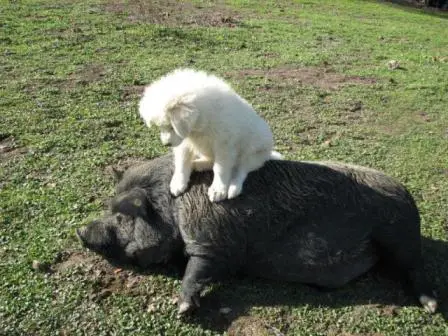Pigs make amazing pets, but it’s also important to know a pig’s smallest quirks and habits, even something as simple as whether they snore or not, to make sure you know what you’re getting into.
So do pigs snore? Pigs do snore while they sleep in the same way that humans do. The volume may vary though, with some pigs snoring louder than others.
A lot of animals actually snore while they’re sleeping. So don’t be surprised when you start hearing your pig making a weird noise when they sleep. They are definitely not the only ones with this habit.
Read on to find out more about why pigs snore when they sleep, as well as about other sounds they make and other habits they have while sleeping.
Why Do Pigs Snore?
There are a lot of reasons that would cause your pig to snore. While some humans feel that a stuffy nose would be the usual reason, it actually goes much deeper than that.
One of the main reasons why pigs (and animals in general) snore is because their soft palate, as well as other pharyngeal tissues, gets in the way and vibrate when the pig breathes in and out. This is especially true when their air passage is narrowed.
What causes this?
Sometimes, their soft palate is too thick or too long. These tissues may be swollen, or the muscles at the back of the throat are possibly too relaxed. Obesity is also another possible reason for a narrowed air passage.
Some may find it annoying when their pet pig snores, while some may think that it’s cute. Know, however, that snoring has a number of health repercussions to your pet.
Here are some issues that are seen in pigs that snore:
- Decreased air flow
- Decrease in oxygen levels
- Poor exercise tolerance
- Poor heat tolerance
These symptoms could prove to be life-threatening to your pigs.

Can You Stop Your Pig From Snoring?
Although your pig’s snoring may not be something you can completely remove, there are definitely ways to lessen it. Not only will this ensure more peaceful nights for you and your pet pig, it will also prolong your pig’s life and make them healthier overall.
It would be great to have your pig checked by a veterinarian who specializes in respiratory issues. This vet can pinpoint where the problem is coming from exactly. Once the root cause is seen, it’s easier to get recommendations on what you can do for your pet.
Sometimes, your vet may suggest surgical intervention, especially if the case is too advanced. If this is the case, you vet would most probably recommend that all other issues be addressed in one single procedure because exposing your pig to anesthesia over and over again may also have its own set of risks.
It’s also important that you let your pig maintain a healthy weight. Some people think that because it’s a pig, it can be fed anything and everything, anytime it likes. But this is not true. This thinking can actually be dangerous.
Preparing a healthy diet for your pig is not only helpful for your pig’s respiratory system, it is helpful for your pig’s overall health.
Stick to feeds that contain all the nutrients, vitamins and minerals that your pig needs at its age, weight, and health status. Sometimes, your vet would recommend that you add some supplements, depending on what nutrients your pig lacks.
Now, if you choose to prepare your pig’s diet, ask your vet what nutrients your pig needs the most and base its diet from there. You can give treats in between meals, but not too much.
Once you master the art of preparing healthy meals for your pig that would keep it at its optimal weight for its age, you do not only help lessen its snoring, you can also help it avoid a number of diseases and health risks.
If you need help in preparing a proper diet for your pig, this article can serve as a guide.
Other Sounds Pigs Make
Snoring isn’t the only sound that pigs make. It can let out a number of different sounds, like oinking, squealing, grunting, and even barking. Experts say that a pig can make approximately 20 distinct sounds.
Each sound that a pig makes has its own unique meaning. And for you to truly understand how your pig is feeling, it is best to learn how to interpret the different sounds that it makes.
A short or a sharp bark, for example, would mean that your pig was startled or shocked. Note that pigs aren’t just startled by sudden movements. They will more likely be affected by loud sounds, like the slamming of a door, for instance. This is because their hearing is very sensitive, so loud noises can be very traumatic for them.
Now, if your pig gives out a series of barks instead of one abrupt one, it’s possible that your pig is threatened. This is usually because it sees or senses something new. It may also be suspicious of a person it’s seeing for the first time maybe, or a new pet you brought home as a companion for it.
As the pig’s bark becomes louder, the more threatened it becomes. And while smaller pigs would usually just cower in a corner and hide, bigger pigs could become aggressive.
Possibly the most familiar sound you’ll hear a pig make is that low grunting sound that it makes while it’s rooting or eating. This sound tells you that your pig is happy and content with whatever it is doing.
When your pig becomes excited, it can let out a series of excited squeals. They usually do this when they know that it’s time to eat and they sense that you’re approaching with their food in tow.
If you witness pigs nursing from their mother, you may also hear the sow giving a low oinking or grunting sound. This is usually the mother communicating with its piglets. Some believe that it’s the sow singing the piglets to sleep.
You may hear your pig make different sounds aside from these. It’s best that you observe them and think about the stimuli for each specific sound. Note that there will be different tones and frequencies, with each of them having a different meaning.
Why do you need to understand the different sounds that your pig makes?
It’s important to be ready for telltale signs that your pig needs your support. When it is threatened or stressed out, for example, it will expect you to take care of possible hazards around it. And there’s no better way to find out if they’re in this state than through the sounds they make.
Other Things Pigs Do When They Sleep
It’s interesting to know that pigs also snore when they sleep, just like humans. But that’s not the only similarity between a sleeping pig and a sleeping person. In fact, some experts believe that pigs also have the ability to dream as they sleep.
Before we get into how a pig dreams, you’d first have to understand what REM is.
REM or rapid eye movement is a stage where humans are in deep sleep. This is where our subconscious starts to work in the form of dreams. When we sleep, we spend at least 25% in REM.
Pigs also go through REM, although they only stay in this stage 10% of their total sleeping time. But considering the fact that pigs also spend around 8 hours sleeping, it’s safe to say that it’s still enough time for them to actually dream.
What makes experts think that pigs can also dream? Their brains aren’t really that impressive, right?
Wrong!
Pigs are actually far smarter than a 3-year old child. They are even said to be more intelligent than dogs. They even require constant mental stimulation. Otherwise, they can get bored and act out.
Knowing this, it wouldn’t be surprising to find out that pigs also dream. After all, if a little kid is capable of dreaming, why should an intelligent pig be any different?
Related Questions
What animals snore?
Hummingbirds, dogs, hamsters, cats, ducks, bunnies, horses — you name it, it probably snores. Believe it or not, there is a long list of animals that snores the same way humans do. You see, snoring is caused by any form of blockage around the air passage. And this is something that can possibly happen in any animal’s body.
Why do pigs oink?
Pigs oink to communicate with each other, as well as with other animals around them (humans included). Pigs are capable of making around 20 distinct sounds, the most common sound being a grunt. Depending on the pitch and tone, these different sounds portray a different emotion or message.
How powerful is a pig’s sense of smell?
A pig’s sense of smell is powerful enough to find food that could possibly be hidden under soil. In fact, pigs are used in Europe to hunt for truffles buried in soil.
